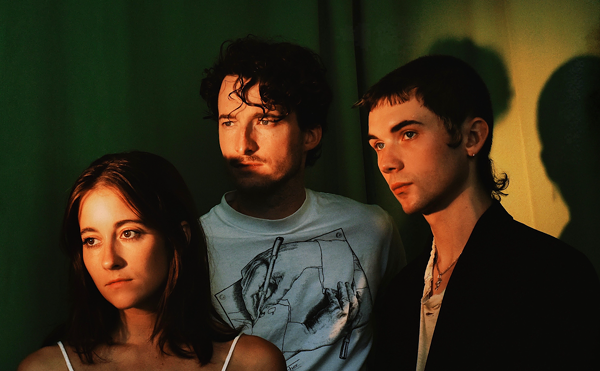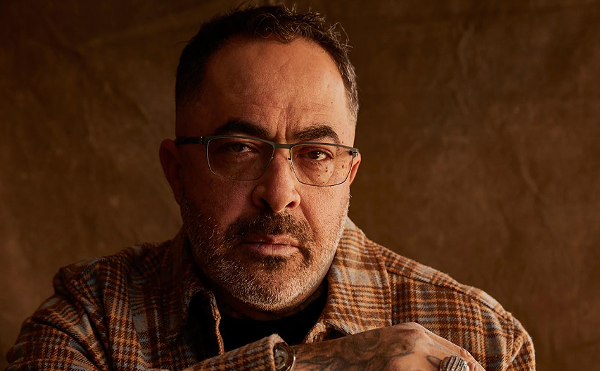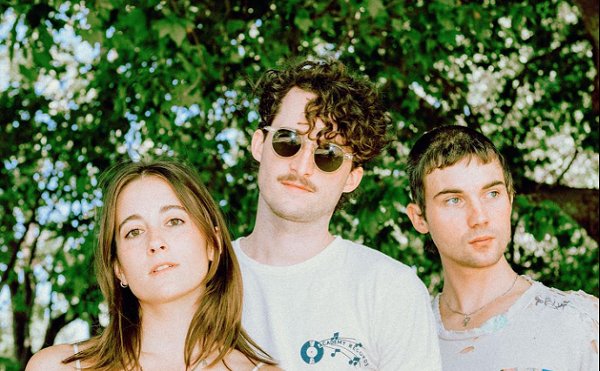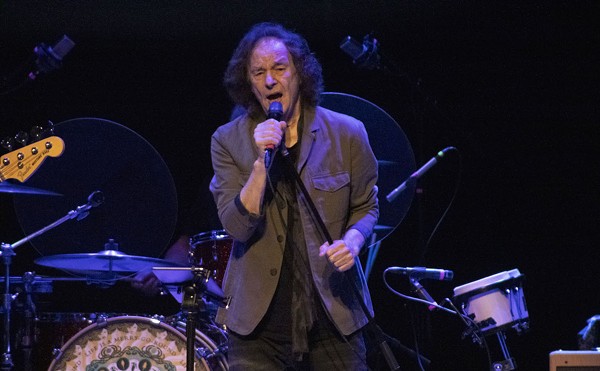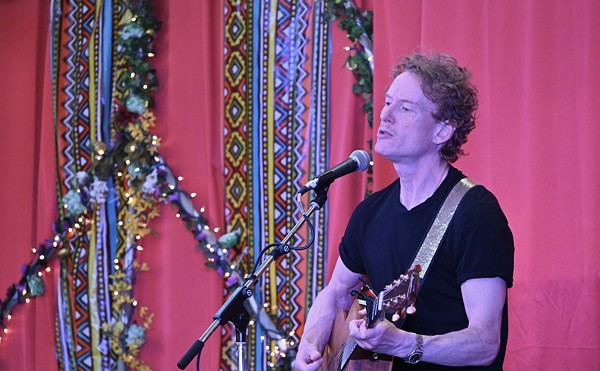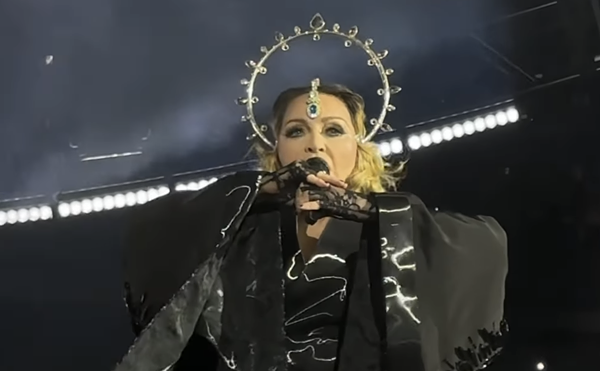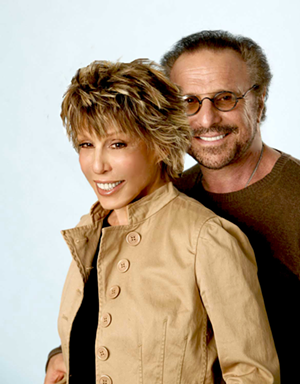
Beautiful, The Carole King Musical opens in Tampa today and tracks the life and times of Carol Klein before she made it big. Her songwriting and romantic relationship with Gerry Goffin is a huge part of the narrative, but so is another couple — Cynthia Weil and Barry Mann.
Individually and together, Weil and Mann are responsible for songs like "Uptown," "Here You Come Again," ""You've Lost That Lovin' Feeling," "On Broadway," "Never Gonna Let You Go," and "Just Once."
CL stole away part of the couple's Sunday afternoon to talk about the production, Weil's new book (806: A Novel), their divorced years and why they work so well together.
"I missed him," Weil told CL about the couple's short divorce.
"I've felt the same way with Cynthia," Mann added.
"It was as if a part of me was amputated, and magically, you know, I was able to get that amputated part put together. My life, so much of my life, has been spent with Cynthia. We are also very compatible in so many ways. The opposite in so many ways, but also very compatible, our humor is similar, and we were really friends, too. I mean when we split we weren't, and that's it, you know."
"We drove each other crazy, but we still missed each other," Weil added. "[This marriage has] lasted a long, long time, and it's stronger than ever."
It was a pleasure to be on the phone with both of them, hear them finish each others' sentences and then send them off for a siesta.
Read our Q&A — and get more information on the run of shows at The Straz Center — below.
Cynthia Weill: Hello?
Hi, is this Cynthia?
CW: Yes.
Hi Cynthia, this is Ray Roa from Tampa, Florida.
CW: Hi.
Is right now an OK time to talk?
CW: Yeah, sure.
Barry Mann: Hello?
CW: I think Barry is on.
Hi, Barry, how are you?
BM: I'm OK. How are you doing?
I'm great, thank you. Thanks for taking time out of your Sunday to do this interview, I really appreciate that.
CW: It's our pleasure.
I love that I'm getting both of you at the same time because, you know, your whoe career is built around each other — do you spend much time apart?
BM: There have been times that we've written about other writers. Times, you know, we do separate things socially sometimes, but we have spent most of our lives together almost 24 hours a day.
[everyone laughs]
CW: We've actually been married about 150 years.
And even more if you count it in songwriting years, right?
Both: Yes [laughing].
And what does your typical Sunday look like, you're in California, so I think it's only 2 p.m. there. Are you on rock star time, just rolling out of bed?
CW: No, it's 2 p.m. here.
So you've been up for a while.
CW: Yes.
BM: You were out.
CW: Yes, I went out and got my hair done and now I'm back, and after hang up we'll probably take a little snooze.
Awesome. That's so awesome. I won't try and hold you from you snooze for too long — I don't have too many questions.
I like that you mentioned how a lot of magazines like Rolling Stone kind of poo-pooed what you were doing in the beginning, but have since come around. What do you feel like rock critics were missing about your music back then, and why do you think they’ve changed their tone? Just because history proved them wrong?
BM: Well history did prove them wrong, but also, I mean, I think the main value of them and in music as songs is that they're so varied and at the same time they were very good time. They're all different genres of songs, I thought that was a very strong suit, you know. When it came to our talent. I think that should've been, they should've been aware of that, at least. But I'm not complaining about it, they've done some stuff, but not enough.
CW: It's never enough for you, honey.
BM: Hahaha.
Yeah, I've seen websites do updated reviews, like 10 years after they've been released.
CW: You know, criticism is a strange thing. We didn't think that much about what we were doing. We just did it naturally. The critics sometimes read more or less into it than what was really there.
\\<\/iframe\>
That's an interesting take. And I guess, reading into some things that critics have written over the years you’ve drawn from a lot of different things (a guy pushing a clothing rack in NYC Garment District, “Uptown”; a friends experience for Dolly Parton’s “Here You Come Again”). I think you’ve mentioned that your current day songwriting is not geared towards today’s music industry, but I am curious about the things that are inspiring you these days or providing any spark for new music.
CW: Well we haven't been writing that much. I have a book coming out, it's called 806, and it doesn't start out in music, but it ends up in music.
BM: And we're involved in a TV pilot that's gonna be made.
Is that more or less because you want to do different things and because you've written so many songs, I mean it is amazing how much you've written.
BM: Yeah, that's part of it.
CW: Yes.
And we're talking about the musical today, and it kind of ends up falling on this message about the uncertainty of life and the expectations we build around it. Sometimes things don’t happen the way you expect them to, but it can still be something beautiful. I think your professional relationship has been long and successful — do you ever wonder what you would be doing had songwriting not been in the cards for you? Like what if you never got in that room, Cynthia where Barry was writing with Teddy Randazzo?
BM: Yeah, good question.
CW: We often think about that. Had my appointment with Teddy been the next day, we wouldn't have met. It just seems that things are either planned or they are unplanned and arbitrary.
BM: If you believe in destiny, then we would have met another time.
Yes, that's highly possible considering the building you were working in.
BM: I think about it a lot now. What would I have done, and how, it's amazing how I ended up getting into the "music business," I hate that expression, you know. It's just amazing to me. It's, it's just amazing, it just really is.
CW: Why is it amazing?
BM: I think you're interviewing me, too. Thank you.
CW: Yes.
[laughter]
BM: It's because I was not a great musician. I had a fairly good ear, and I took, I didn't take a lot of music lessons. I learned to play the piano, you know, just about a year and a half, I just learned the notes. Then I took about a year of popular piano, and I learned chords, and I picked up ukulele, and I learned chords that way. I don't know why I didn't pick up a guitar, but anyway, that was basically my education. And I evidently had something else going for me to have written all those songs that I've written.
CW: And some of them are so complex, musically.
BM: Some of them are.
CW: I'm thinking of "Never Gonna Let You Go," and "Just Once."
BM: Yeah, chord-wise, some of them are, and there is such a variety. That's why I say, it's amazing — I'm bewildered.
\\<\/iframe\>
Yeah, the body of work is incredible, and to hear you talk to each other and think about the way you've pushed each other throughout your careers is pretty cool. A lot of people never get to have, you know, a songwriting partnership, let alone a fruitful that yours has been. I wanted to ask you about you being competitors (and friends) with Carole...
CW: And Gerry.
Yes, and Gerry in what was essentially a NYC school of songwriting (not a songwriting factory).
BM: I hate that term.
CW: Yes, he said songwriting school, not factory.
BM: Yes, school, well, good. That's what it should be.
Yeah, well that's what it is. I like that you mentioned earlier the phrase "music business" — kind of two dichotomous words there.
BM: Yeah, and "factory" you just get an image that we just stamp out songs, and that's not how it went. Sometimes we wrote a song quickly. Other times it took a while, you know. "Factory" always bothered me. Anyway.
I think you’re Taylor Swift, Sara Bareilles and Ed Sheeran fans, but are there any modern day actual songwriting teams you think do a great job similar to how you did it?
BM: I just think of Ed Sheeran — he's not a team, but he's very good.
CM: I love those guys that wrote "[Dear] Evan Hansen."
OK. Cool, and I wanted to ask, you’ve got friends from everywhere, cut from every cloth, and you’ve talked about the guilt you felt when you got caught up in the competitive songwriting. I gotta know, is Jewish guilt worse than Catholic guilt?
BM: Haha.
CW: We have often asked our catholic friends that.
And what do they say?
CW: [laughs] it seems that they are about the equal, except that Catholics can go to confession and then start all over again.
Yeah, we kind of have a cop out. I grew up in southern California as a Catholic thinking I was Jewish because all my friends were Jewish.
Both: [laughter]
And my dad was like, "Wow, you are just not doing...too well, son."
CW: Were you Catholic?
I am still Catholic, yeah, but I asked my dad when my Bar Mitzvah was, and he just kind of looked at me like, "Wow." I just have two more questions. You were seperated for just under two years — are you OK with sharing what led you to get back together?
BM: Umm...
CW: I missed him.
BM: I've felt the same way with Cynthia.
CW: We drove each other crazy, but we still missed each other.
BM: It was as if a part of me was amputated, and magically, you know, I was able to get that amputated part put together. My life, so much of my life, has been spent with Cynthia. We are also very compatible in so many ways. The opposite in so many ways, but also very compatible, our humor is similar, and we were really friends, too. I mean when we split we weren't, and that's it, you know.
CW: It's lasted a long, long time, and it's stronger than ever.
BW: It really is. I don't advocate that couples should split for a few years, um, because it's painful, but when you get back together — which is rare, by the way
Yes, it is.
BW: It just is, there's just so much more love — it's deeper.
And Cynthia, and do you remember, was that a phone call? Did Barry come crawling back, or — how'd that go?
CW: Well, were in touch all the time when were seperated, it's just the phone calls became more frequent, and we admitted to each other that we missed each other terribly.
Aw, that's awesome. And last question. I think you were close with members of the Broadway cast who played you, and I’m not sure if you’ve been able to see the touring cast...
BM: We saw...
CW: We went to Fresno for our anniversary and took our family.
Oh, cool.
CW: So we met the touring cast.
BW: And we also met the touring cast in L.A.
CW: Yes, although it's a different touring cast.
BW: Yeah.
Yeah, it's been a good run.
CW: It's been touring, for I think three years. People change.
BW: Have you seen it by the way?
I haven't seen it yet. We have it coming into town, here in Tampa this week. So as a final thought, what do you hope theater goers see in the portrayals of you onstage? What do you hope they walk away with. I mean, Carole's name is on the musical, but really it's the story of this era, this relationship, you guys are a big part of it.
BM: Well, I know some people walk out and say that they didn't realize that it took a lot of talent to write those songs, and that was one thing. Also, they come out, for some reason, even though there is a lot of serious stuff in it, there's a lot of stuff that makes people feel good. They walk out of that theater just feeling good.
CW: Feeling good, yeah. I think it's because of Carole, honestly.
BW: Yeah, it is, and the relationship between Carole and Gerry, and Cynthia and I is really very touching and moving. The music of that time, the people who come to see that show have no idea that Carole wrote all those songs. They don't even realize how many more songs we wrote also, not more than Carole, but they have no idea, and they are always so shocked when they see it. "She wrote that? And she wrote that?" That's something that people come out of the theater amazed by that.
Awesome, well thank you for giving me a little bit of your afternoon. I hope you have a great nap.
[Laughter]
CW: Happy to talk to you, and if there is anything else that you need to know just call.
OK, thank you so much. Have a great afternoon.
CW: You, too.
Bye.
Both: Bye.
\\<\/iframe\>






